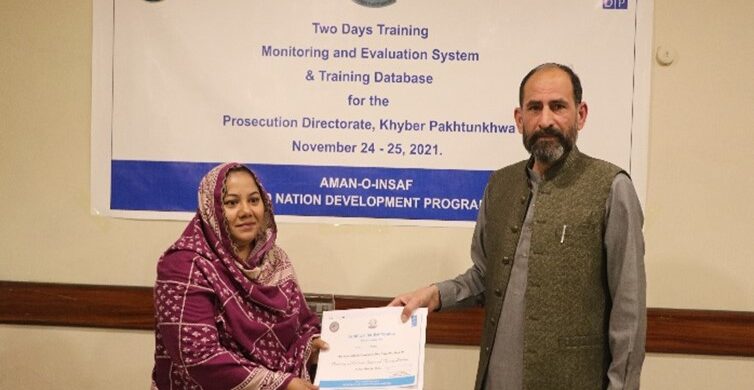Thematic Area: Governance and Rule of Law
Project Period: 2021
Donor Agency: UNDP
Project Locations: District Peshawar of Khyber Pakhtunkhwa
Project Goal: Managing trainings of police and prosecution under UNDP Aman-o-Insaf Program
Project Background
UNDP Supporting Rule of Law for Peaceful, Just, and Inclusive Societies (Amn-o-Insaf) aims to promote an enabling environment to support the Government and rule of law institutions in its ongoing efforts to secure peace and stability in Pakistan. Under this program and the support of government and international development partners, assistance is provided for institutional development and capacity building to the rule of law institutions to ensure effective and timely delivery of justice services.
In Khyber Pakhtunkhwa province, the Program has been engaged with key stakeholders including the Judiciary, Police, Prisons, Local Government, Prosecution, Bar Council, and Community Based Organizations, the Program seeks to enhance confidence and trust between local communities and the rule of law institutions. Strengthening Prosecution Service is one of the priority areas of the Program. The need for a Prosecution Training Academy is highlighted in the Khyber Pakhtunkhwa Rule of Law Roadmap.
The Program intends to develop a robust monitoring and evaluation system and a training database to ensure proper implementation of training strategy and timely delivery of training. The M&E plan will ensure the collection of gender-disaggregated data, provide reporting and monitoring tools, and assess the impact of the training.
Training Objective
The specific objective of the training event is
- Familiarize participants from prosecution department on already developed training management system
- Highlight the importance of developed database management system to monitor and evaluate training programs accordingly and efficiently
- Training the participants on how to use and access the system database step by step and its alternate modes of operation, covering both technical and operational aspects.
TRAINING EFFECTIVENESS
To evaluate the effectiveness of the training whether the training was effective or not for this purpose analysis of pre-test and post-test was carried out and paired sample t-test was used to know the effectiveness of the training. Marks are continuous (scale) data, continuous data are often summarized by giving their average and standard deviation (SD), and the paired t-test is used to compare the means of the two data sets. The paired t-test compares the mean difference of the values to zero.
Criteria
Sig-t ≤ α Reject H0
Sig-t ≥ α Fail to reject H0
Decision
Since sig-t (0.002) < 0.05 therefore we reject the null hypotheses and accept the alternate hypotheses.
Conclusion
From the above calculation there is significant evidence to conclude that there is significant increase in knowledge of the training participants. Thus the training program is significantly effective to improve participant’s knowledge at 0.05 level of significance on monitoring and evaluation system and training management system.








